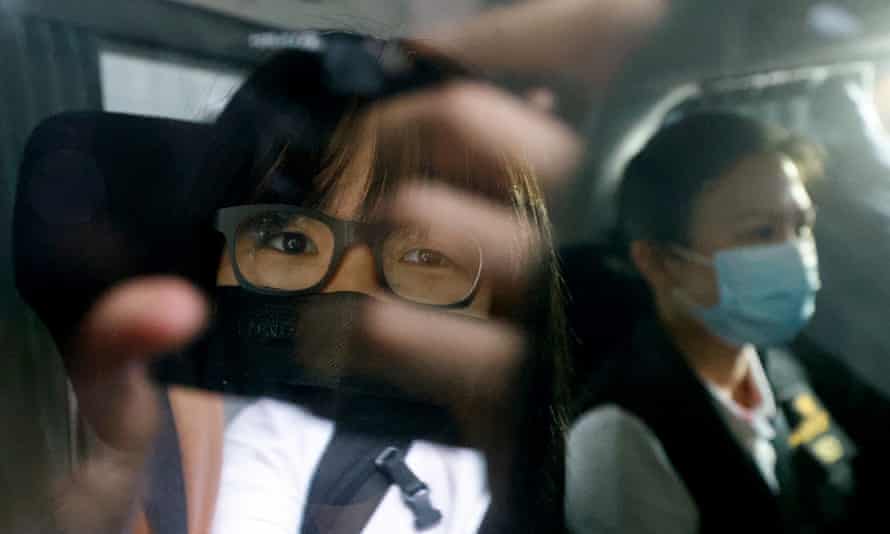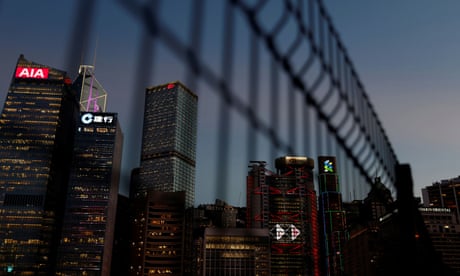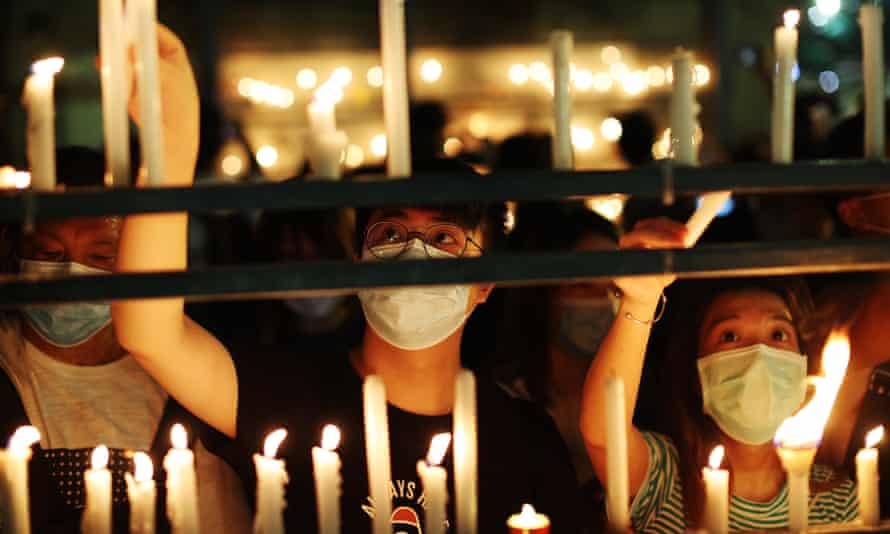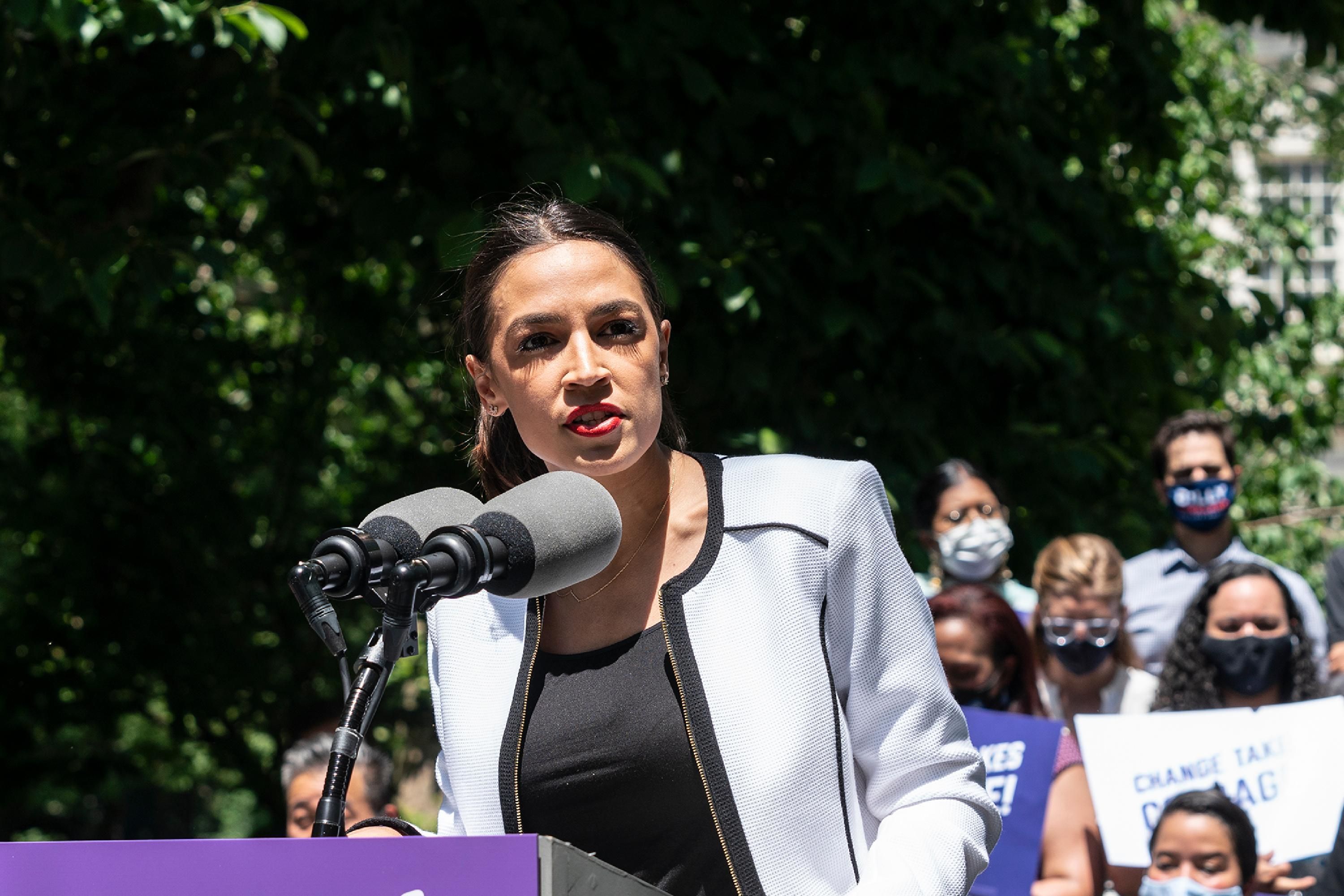The shuttered museum was run by the group that organized the Tiananmen vigils in Hong Kong. Separately, the group's vice-chairman and 11 others pleaded guilty of defying a ban on the vigils.

The June 4th museum, commemorating the bloody Tiananmen Square crackdown, has been shut down for months
Hong Kong police on Thursday raided a museum dedicated to the victims of China's 1989 crackdown on pro-democracy protesters in and around Beijing's Tiananmen Square.
The raid came just hours after a dozen Hong Kong democracy activists pleaded guilty to participating in an unauthorized candlelight vigil marking last year's anniversary of the massacre.
Exhibit items seized
Officers of the newly created national security unit carted away artwork, documents and exhibits from the museum as evidence.

Security officers seized a cardboard featuring pictures of annual candlelight vigil from the museum
Police seized a giant logo of the museum and photos of the huge candlelight vigils that Hong Kong activists had held for Tiananmen's victims, as well as a paper model of the Goddess of Democracy — a symbol of the 1989 pro-democracy student movement in Beijing.
The museum was closed this year as authorities were investigating a lack of appropriate licenses, and the group running it was fined 8,000 Hong Kong dollars ($1,000, €847).
Activists arrested under national security law
The museum is run by the Hong Kong Alliance group, which had organized Tiananmen Square vigils in the city.
The group had been accused of working as a "foreign agent," and authorities had questioned its operational and financial information.
It is seen as the latest target of a sweeping national security law that Beijing imposed on Hong Kong.
Several members of the Hong Kong Alliance are already in jail on national security charges.
On Thursday, 12 democracy activists pleaded guilty to unauthorized assembly charges over the Tiananmen vigil in 2020, which was the first one banned by authorities since 1990.
The alliance's jailed vice-chairman Albert Ho was among them. He said he rejected the "foreign agents" accusation, and that local groups supporting democracy had formed the alliance.
"We were driven by our consciences and moral commitment to make our best endeavors to maintain this historic tradition of commemorating June 4th, remembering the lesson of history and speaking truth to power," he said.
Yeung Sum, a former lawmaker and one of the 12 who pleaded guilty, said they would continue to fight for democracy.
"The June 4 candlelight vigil may be banned forever... but the flowers of liberty will blossom regardless of the storm. Hong Kong people will continue to seek our way to democracy and freedom."
HONG KONG MARKS TIANANMEN ANNIVERSARY — IN PICTURESCleaning the Pillar of ShameHong Kong students clean the Pillar of Shame statue on the 32nd anniversary of the massacre on Tiananmen Square, which officially left 300 people dead, according to government statistics, after the Chinese military brutally suppressed protests in support of democracy. Independent international estimates put the toll at several thousand.

Chow Hang-tung (C) vice chairwoman of the Hong Kong Alliance in Support of Patriotic Democratic Movements of China was arrested along with standing committee members Leung Kam-wai, Tang Ngok-kwan (both pictured) and a third member amid allegations the group was acting as a foreign agent in violation of Hong Kong's national security law. Photo by Jerome Favre/EPA-EFE
Sept. 8 (UPI) -- Police in Hong Kong on Wednesday arrested four leaders of one of the city's most prominent pro-democracy groups.
Four members of the Hong Kong Alliance in Support of Patriotic Democratic Movements of China were arrested after they said police sought details about its funding and membership as part of an investigation into whether it was acting as a "foreign agent" in violation of the government's sweeping national security law.
"Police operations are continuing and it cannot be ruled out that more people may be arrested," police said in a statement confirming the arrests.
The group said the arrested members included vice chairwoman and barrister Chow Hang-tung along with standing committee members Leung Kam-wai, Tang Ngok-kwan and Chan Dor-wai.
RELATED 7 pro-democracy Hong Kong protesters sentenced to prison
Chow posted on social media Wednesday morning that police had been ringing her doorbell and attempting to open her door.
The Alliance on Sunday said it would not comply with the police orders to turn over personal details of its members and meeting records with political groups in Hong Kong, Taiwan and elsewhere.
Chow rejected the idea the group was acting on behalf of foreign powers, telling reporters Sunday they are "agents of the Hong Kong people's conscience" and calling the police order "an abuse of power."
RELATED New Hong Kong law aims to ban movies with subversive, dissenting themes
"They are trying to intimidate the people who participate in social movements," she said. "We will now clearly state that this sort of intimidation will stop at us. We will not transmit that fear through our compliance."
The city's security agency responded with a "solemn warning" later Sunday stating that "endangering national security is a very serious crime" and the Alliance "should immediately turn back before it is too late."
The security law was signed into law by Chinese President Xi Jinping last year imposing penalties ranging from up to three years to life in prison for secession, sedition, subversion, terrorism and working with foreign agencies to undermine the national security of the People's Republic of China in Hong Kong.
RELATED Hong Kong says patients with COVID-19 Mu variant came from U.S., Colombia
The law was initially tabled after prompting months of pro-democracy protests in 2019 and received widespread condemnation internationally.
The Alliance was formed more than 30 years ago to support pro-democratic protests in Hong Kong and has also organized the annual vigil on the anniversary of the Tiananmen Square massacre.
Chow Hang-tung, a barrister and organiser of the Hong Kong Alliance, wrote on Twitter ‘Any farewell words for me?’ before she was detained

Helen Davidson in Taipei
@heldavidson
Wed 8 Sep 2021 03.11 BS
Hong Kong police have arrested several members of the group that organised the city’s annual Tiananmen Square massacre vigil, after it was accused of foreign collusion by the authorities.
The Hong Kong Alliance in Support of Patriotic Democratic Movements of China said police arrived at the offices or residents of several members early on Wednesday morning. The arrests come amid increasing crackdown on political, professional and civil society groups, which the government has accused of unpatriotic conduct or national security offences.
Chow Hang-tung, vice-chairwoman of the organisation, was arrested at her office in Hong Kong’s central business district, according to local media. Chow had earlier posted to Facebook saying people, presumed to be police, were ringing her doorbell and attempting to crack the door code: “Any words of farewell for me?” she said.
At least three others were also arrested, according to the South China Morning Post, including standing committee members Leung Kam-wai, Tang Ngok-kwan and Chan Dor-wai. The police said investigations were ongoing and it did not rule out further arrests.
British foreign secretary Dominic Raab strongly criticised the arrests. “Today’s arrests of members of the Hong Kong Alliance are another chilling demonstration of how the national security law is being used by Beijing to dismantle civil society and stifle political dissent in Hong Kong,” Raab said on Twitter.
Chow, who is also a barrister, was due to appear at a bail hearing later on Wednesday to represent Gwyneth Ho, an opposition politician charged with conspiracy to commit subversion. Ho is among 47 politicians and campaigners who were arrested for holding unofficial primaries ahead of a general election which was later postponed.
On Tuesday the Hong Kong Alliance formally refused a police request to hand over information about its finances, membership and operations last week, saying police were abusing their power to invoke fear, by making “a fishing attempt to construct stories and conspiracies” against civil society groups.
“I want to tell Hong Kongers that we need to continue to resist, never surrender to the unreasonable power quickly and easily,” Chow told media on Tuesday when she went to police headquarters to inform officers she would not provide information they had requested.

Hong Kong: international companies reconsider future in wake of security law
In its letter demanding the information, police accused the alliance of being “an agent of foreign forces” and requested the information by 7 September. Failure to comply could bring six months’ jail time or a HK$100,000 (£9,300) fine, it said. After the refusal, Hong Kong’s security chief, Chris Tang, vowed follow-up action and said law enforcers would act quickly.
Without naming the alliance, the police force’s national security department said one of several organisation had refused requests to provide information, and “police severely condemn such acts”.
The 32-year-old organisation formed amid student protests in China in 1989, which later saw Chinese authorities killing untold numbers of protesters in Beijing and other cities. In subsequent years the alliance held annual mass candlelight vigils on the anniversary of the Tiananmen Square massacre on 4 June, often attended by hundreds of thousands of people. The previous two vigils have been banned by authorities citing pandemic restrictions, and there are widespread concerns that under the national security law it will not be legally held again.
The national security law punishes acts which authorities deem to be secession, subversion, terrorism or collusion with foreign forces with sentences of up to life in prison.
Samuel Chu, a US-based Hong Kong activist and founder of the Hong Kong Democracy Council, which he has since left, told the Guardian the national security law “has proven to be the perfect weapon against civil society, forcing self-censoring and the disbanding of both new and old groups.”

Chu’s father, the activist Reverend Chu Yiu-ming, was a senior member of the alliance and served on its standing committee from its inception until last year, alongside the founding chair, Szeto Wah, who died in 2011. In the weeks after the 1989 massacre Rev Chu, Wah and the alliance were among groups running ‘Operation Yellowbird’, which helped about 400 wanted activists and dissidents escape China through Hong Kong.
“The rapid and complete closing space for civil society is not abstract or merely academic. For me – and so many Hongkongers – Hong Kong’s civil society is personal and generational. It is how we mark the passage of time and history as Hongkongers,” said Chu.
The alliance had already scaled down in an attempt to protect itself from persecution. Lee Cheuk Yan and Albert Ho are among numerous high-profile activists serving prison terms over their roles in the 2019 pro-democracy protests that roiled Hong Kong.
Last week the Civil Human Rights Front (CHRF) disbanded, saying no members were willing to perform secretariat duties after its convener, Figo Chan Ho-wun, was jailed for 18 months over a 2019 rally. The CHRF is also under investigation by police.
On Tuesday the city’s leader Carrie Lam said a group couldn’t call itself civil society if it defied the law.
“It’s not for her to decide. Does the government own the power to decide the definition of a civil society organisation?” Chow said in response. “By labelling everyone as foreign agents, as not civil society, they can do anything and it’s wrong.”
She said if there was any risk to the group in refusing the demand, it was a political one, as any arrest or charge would be without justification.
“The stronger you resist of course, the more they’ll want to suppress you.”

















